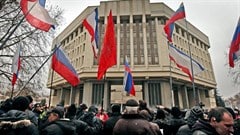Unlike the impetuous and immature US leaders with itchy trigger fingers and an agenda of expansion that I do not have, I’ve been waiting to find out whether or not Russia invaded Crimea. We cannot know this with more certainty without learning more about the deal between Crimea and Russia, the back and forth between their governments, the view that Russia holds regarding the Kiev interim government, and the identities of the armed forces now in Crimea and also their relationships (are they fighting? killing? wounding?). Russia has leased bases in Crimea and does already have a right to a substantial armed force there.
This CNN article is helpful, and we get two conflicting views between Ukraine and Russia.
As far as I can tell right now, the following are factual.
1. Russia didn’t invade Crimea. An invasion would involve a large-scale offensive with casualties. There are no such reports. It would involve a different objective than securing bases already under lease by Russians or protecting the Crimean government.
To quote wikipedia:
An invasion is a military offensive in which large parts of the armed forces of one geopolitical entity aggressively enter territory controlled by another such entity, generally with the objective of either conquering, liberating or re-establishing control or authority over a territory, forcing the partition of a country, altering the established government or gaining concessions from said government, or a combination thereof…Due to the large scale of the operations associated with invasions, they are usually strategic in planning and execution.
None of this applies in this case. I do not see that the word “invasion” applies. I know of no casualties or attempts by Russia to take over Crimea or its government. The Crimean parliament has not issued distress calls. Some of the illegitimate government officials in Kiev have termed it an invasion and loudly called for outside interference, but their statements seem to me to be self-serving exaggerations. The objectives of Russia at this point appear not to be to use its forces to alter Crimea’s government or gain authority over that government by force of arms.
The public information we have doesn’t warrant a crisis mentality or Washington rhetoric involving threats.
2. Whatever Russians crossed into Crimea or did nor cross, we are unsure who they are. Ukraine paints them as Russian army. Putin paints them as volunteers and local militias. Whoever they are, their actions so far have not been bloody or outright hostile as would be the case in an invasion. There are reports of almost amicable interactions between Crimean-Ukrainian soldiers and these other contingents.
The incursion, such as it is or is not, appears not to be an invasion and not having an objective of taking over Crimea by Russia. The objective appears to be the protection of existing Russian interests in Crimea at a time when the Kiev government is illegitimate in Russian eyes.
3. Information conflicts about Russian ultimatums to Ukrainian-Crimean forces. I can’t comment much on that. There appear to be no Russian ultimatums involved. The door is open, however, for Crimea to vote in parliament and/or by a referendum to alter its political connections with Ukraine and Russia. It is this alteration that the U.S. is against, while supporting a government in Kiev that has attained power by force.
Patience, calm and moderation are called for by all.
As an example of the opposite, I mention Senator Dan Coats of Indiana. His response to the events in Ukraine and Crimea is very hostile:
On Wednesday, I introduced a resolution to support the territorial integrity of Ukraine and to condemn recent Russian military aggression. The resolution proposes sanctions and other measures to compel Russia to withdraw from the Ukrainian region of Crimea.
My intention is to contribute new, meaningful ideas for President Obama to consider as a strong response to Russia’s military invasion of a neighbor. The proposals are designed to isolate Russia and would inflict real pain on Putin and Russian interests. Some of these ideas can be accomplished unilaterally, while others require us to lead our allies toward broader agreement.
My resolution seeks to isolate and punish Russia by calling for:
- Expelling Russia from the G-8;
- Suspending operation of the Russia-NATO Council and expelling Russian representation;
- Downgrading U.S. diplomatic representation;
- Closing two U.S. Consulates General;
- Requiring Russia to take reciprocal steps to close Consulates it has in the U.S.;
- Expanding significantly application of the Magnitsky Rule of Law Accountability Act;
- Calling on FIFA to reconsider its decision to place World Cup 2018 matches in Russia; and
- Suspending eligibility of Russians for seasonal work visas.”
Coats wants a new cold war or even hot war. He wants Russia to retaliate. He wants to burden Americans with another serious conflict, this time with a major nuclear power. He wants hostility to replace cooperation. And he wants to do all of this when he really doesn’t know that an invasion has occurred.
Treating Russia like a pariah is imprudent in the extreme. Coats would cut off relations with Russia. The mentality here is that the U.S. uses force to get its way, not any attempts to reason with those whose actions it disapproves of.
The US and the Soviet Union maintained diplomatic relations through the Cold War. The current Crimean issue is small potatoes by comparison. Coats is reacting in extreme fashion.
Furthermore, as is obvious to everyone in the world except Washington and its compliant media, the US is invoking a double standard when it threatens Russia over Crimea.
Beyond that, the language in these suggestions of Coats shows intemperate haste and inaccuracies. It shows over-reaction. There has been no aggression. There has been no invasion. He wants to compel “Russia to withdraw from the Ukrainian region of Crimea.” However, Russia has a right by lease agreements to be in Crimea.
Reprinted with permission from LewRockwell.com.

